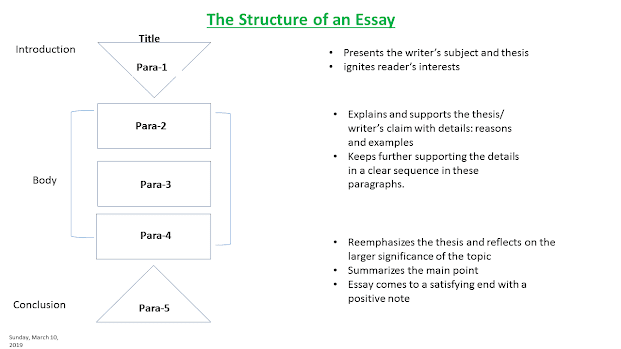 |
| (Image Credit Source: Gardner, Peter. S (2005) New Directions, CUP. |
a.What b.Why c.How d. Who e.Where f.When g. Whose h. Which
4. Write a strong thesis statement and
underline it.
5. Write in not less than five
paragraphs.
6. Connect your paragraphs with suitable
transitional words and phrases.
7. Keep your paragraphs at moderate length.
8. Underline important statements and
data in the paragraphs of your essay.
9. Let your essay not go beyond 250-350
words
B. Language and
Style
1. Use very lucid
and simple language as far as possible.
2. Make use of only
very formal and decent words.
3. Avoid the use of
slang and taboos at all costs.
4. Make use of
idioms and phrasal verbs to precisely describe your issue.
5. Every time you
use a proverb, you need to establish it with a suitable example.
6. Bring examples
from several different sources like-
a.
History
b.
Literature
c.
Current Affairs
d.
Life Experiences.
7. Use the tense as
per the type of your essay like-
a) Past tense for a
narrative essay: A visit to a Historical Place
b) Present or future
tense for a reflective essay: Patriotism
Tips for Writing Short Guided Story
A. Format and Layout
1. Do not forget to
mention the title at the top center.
2. Let the title not
exceed 3 or 4 words at the most.
3. Write your story
in the facing pages only if possible.
4. Have a minimum of 5
short separate paragraphs.
5. It looks better
if you leave a line after the completion of every paragraph.
6. Never forget to
mention the moral at the bottom of the page and underline it.
B.
Language and Style
1. Follow the
principle of KISS. (Keep it short and simple)
2. Make use of the
past tense except for the dialogues.
3. Make use of
contraction in all dialogues.
4. Use adverbs and
adjectives to precisely describe the actions and circumstances.
5. At times make use
of inverted language. (Begin sentences with a negative adverbial)
6. Do not use slang
and other taboos, however, you can use colloquial language as per the
characters.
7. Make use of at least one set of dialogues but do not dramatize your story with only dialogues.
8. Give reasonable
and convincing names to characters, but never use popular names usually of sports stars,
politicians, scientists, etc.
9. Never change the version of the given outline, just follow the given plot.
10. Make careful use of phrasal verbs, idioms, and even proverbs to embellish your
story.
11. Be
careful with your grammar; do not ignore it.
12. Ensure
that your story pleases people of all ages, especially little children must
find it interesting.
***



